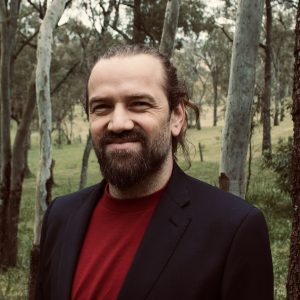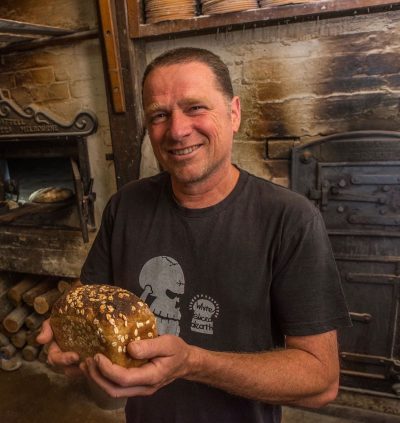John Reid Fellowship
Congratulations to the inaugural recipients of the John Reid Fellowship 2023:
Jacob Birch & Shingi Nyabonda (Food Next Door Co-Op)
GrAiNZ and the Australian Food Sovereignty Alliance (AFSA) is thrilled to announce Jacob Birch and Shingi Nybonda (Food Next Door Co-op) as the inaugural recipients of the John Reid Fellowship 2023.
After raising $8,000 in funding for the Fellowship at GrAiNZ Gathering earlier this year, two inspiring projects rose to the top, leading to the decision to split funding between both projects.
About Jacob Birch
 Jacob Birch is an academic, entrepreneur, and Churchill Fellow passionate about re-awakening, and bringing into a modern context, the native grain foodways that sustained his Gamilaraay ancestors for thousands of generations. Jacob’s professional journey into the native grain space began by conducting transdisciplinary research to investigate the nutritional qualities of Australian native grains for human consumption and presenting those results through a Gamilaraay lens to give agency to First Nations voices and experience. Jacob advocates for a First Nations led industry and pushes back against the capture of native grains into the industrial food system in favour of showcasing a return to Indigenous ways for a regenerative, equitable, and just future for all. Jacob’s passion is driven by the holistic suite of benefits native grains offer, including restoring native grasslands for carbon storage, biodiversity, and landscape resilience; food sovereignty, including asserting Indigenous rights to control and maintain their foods; cultural and social revitalisation through revitalisation of traditional food knowledge and practices; and importantly, the underlying opportunity to increase capacity and capability within First Nations communities as they move along the path towards nation building and self-determination.
Jacob Birch is an academic, entrepreneur, and Churchill Fellow passionate about re-awakening, and bringing into a modern context, the native grain foodways that sustained his Gamilaraay ancestors for thousands of generations. Jacob’s professional journey into the native grain space began by conducting transdisciplinary research to investigate the nutritional qualities of Australian native grains for human consumption and presenting those results through a Gamilaraay lens to give agency to First Nations voices and experience. Jacob advocates for a First Nations led industry and pushes back against the capture of native grains into the industrial food system in favour of showcasing a return to Indigenous ways for a regenerative, equitable, and just future for all. Jacob’s passion is driven by the holistic suite of benefits native grains offer, including restoring native grasslands for carbon storage, biodiversity, and landscape resilience; food sovereignty, including asserting Indigenous rights to control and maintain their foods; cultural and social revitalisation through revitalisation of traditional food knowledge and practices; and importantly, the underlying opportunity to increase capacity and capability within First Nations communities as they move along the path towards nation building and self-determination.
About Jacob’s project:
Using his honours research as a springboard, Jacob has connected with a broad range of stakeholders from across the globe to understand the complexity in authentically re-awakening the native grain food system. Through this work, he has amassed considerable knowledge and insight into the native grain space. In drawing together the threads, between and within the complexity of this space, it has become clear that reawakening this industry has the potential to begin providing solutions to some of humanity’s biggest existential threats, and could fundamentally shift paradigms for First Nations people. However, this can only work if First Nations people can assert their right to self-determination and have decision-making authority within this space.
Self-determination, in the context of this project, is synonymous with nation building. It’s about having the capabilities, capacities, systems, and structures in place for a nation, clan, language group, or community, to be able to make decisions that relate to them on their lands. In the context of the native grain industry, it requires leadership that represents the communities upon which the work is being done. For example, the Gamilaraay people once operated extensive native grain systems; it is on Gamilaraay Country where the first commercially viable crops, in a modern context, have been re-established; it is on Gamilaraay Country where significant research is happening; and it is the Gamilaraay people who are beginning to activate around this opportunity. Therefore, it must be the Gamilaraay community who asserts independent governance of the native grain industry, with and for Gamilaraay Country.
Moving away from a national body to lead the native grain industry and putting the power into the hands of a self-determining community challenges the current paradigm which seeks to replicate the top-down approach of Western models or to hold these governance structures within Western institutions. This new paradigm is not new at all, but rather a return to our old ways of governance, a time-tested model that is based on reciprocity, relationality, respect, and responsibility. Therefore, we are looking at the First Nations led development of the native grain industry not only as an opportunity to develop an exciting new agricultural opportunity, but also as an opportunity to simultaneously use the development of the native grain industry as a vehicle for nation building. This will be achieved by setting up independent systems and structures of governance, whilst also growing the capacity and capability within communities. Paramount to both outcomes being successful is clear direction under robust leadership.
Therefore, the aim of this project is to engage with the Gamilaraay community to co-design a strategy to use the development of the native grain industry as a nation building tool. Our intention is that our model can be replicated by any community across Australia and used as a template to be implemented within their own community, tailored to their own food, agricultural, or land-based opportunity. The expected outcomes of this project will be:
- The publication of a comprehensive and robust roadmap which details the strategies and activities required for the development of a First Nations led native grain industry within 10 years, whilst simultaneously growing the capacity and capabilities of First Nations communities to assert self-determination.
- The establishment of an independent, Gamilaraay led governing body that will oversee the research and development of the native grain industry on Gamilaraay Country to ensure a holistic suite of benefits emerge in line with community aspirations and expectations, with the intergenerational purpose of being a vehicle for nation building.
About Shingi Nyabonda & Food Next Door Co-Op:
 Shingi is a passionate advocate for rural activation through agriculture and micro-scale industry. His lifelong dedication to transforming lives through small-scale farming was inspired by his extended family of farmers and tinkerers. Throughout Shingi’s career, he has worked on various agricultural projects, from growing maize, beans, and mushrooms to small-scale banana extension work in rural communities. After a brief stint in wine bottling and banking, Shingi returned to his roots and now serves as the Executive Officer of Food Next Door Co-op Ltd, a small-scale farming cooperative in Mildura. His work involves supporting refugee migrants in regaining a sense of belonging by providing access to agricultural land, capacity building, and community experiences. At Food Next Door Co-op Ltd, the organisation focuses on growing culturally appropriate foods to feed Mildura’s large migrant population. Shingi’s dream is for the Sunraysia Region to be a beacon of a fully localised food system in the Sunraysia Region.
Shingi is a passionate advocate for rural activation through agriculture and micro-scale industry. His lifelong dedication to transforming lives through small-scale farming was inspired by his extended family of farmers and tinkerers. Throughout Shingi’s career, he has worked on various agricultural projects, from growing maize, beans, and mushrooms to small-scale banana extension work in rural communities. After a brief stint in wine bottling and banking, Shingi returned to his roots and now serves as the Executive Officer of Food Next Door Co-op Ltd, a small-scale farming cooperative in Mildura. His work involves supporting refugee migrants in regaining a sense of belonging by providing access to agricultural land, capacity building, and community experiences. At Food Next Door Co-op Ltd, the organisation focuses on growing culturally appropriate foods to feed Mildura’s large migrant population. Shingi’s dream is for the Sunraysia Region to be a beacon of a fully localised food system in the Sunraysia Region.
About Shingi’s project:
The project is to research and understand the requirements to activate a small-scale milling facility. The facility will allow Food Next Door Co-op to fully capture the maize supply chain from production to distribution firstly within Mildura, Victoria and then to other communities of Melbourne and Adelaide. Food Next Door Co-op grows between four and six tonnes of maize/corn and beans yearly. However, the farmers carry excess grain stock because of the high milling cost. This results in the reluctance to grow because of the flour processing barrier. The grain is inefficiently processed or sold to subsidise incomes. Food Next Door Co-op already has a mill awaiting installation but there has been limited success in activating the mill. Key to success is premises that meet Mildura Rural City Council requirements. Therefore, the project is to investigate and plan for the activation of a maize mill facility in Mildura.
Food Next Door Co-op, was established to find neglected or under-used land in Sunraysia and match it with newly resettled refugee migrants. The land is regeneratively cultivated and produces chemical-free staple and innovative foods for the Mildura community. Our co-op allows recently relocated migrants to assimilate into their new home area and engage in mainstream economic activities while they acquire English language proficiency. The maize and dry beans are consumed mainly by the migrant demographic of Latin America, Southeast Asia, and African backgrounds. The grains are grown using regenerative practices and bio-dynamic farming, restoring soil life and nutrition. By developing a small-scale, food-safe milling and packing point in Mildura, we can allow our cooperative members to mill the grain they grow and fully localise the supply chain from paddock to plate. Having a milling facility in the co-op reduces the cost of milling and improves the ease of access to flour for members and an income stream for the co-op’s sustainability.
This project must produce a blueprint and plan of execution for the Food Next Door Co-op to set up a mill at the community demonstration farm. This includes collaboration with the local council and micro-scale millers to understand milling standards, food safety and labelling requirements, and to design a small-scale portable milling facility. There are, in principle, agreements with the United Africa Farm in Melbourne and The Social Enterprise Precinct at The Queen Victoria Markets to supply our packaged products as soon as we can provide a product that meets Australian food safety standards. In addition, the local Mildura area is interested in consuming the produce from Food Next Door Co-op farms, which cements our place in the local food system.
About the John Reid Fellowship
The John Reid Fellowship aims to continue on John’s legacy to galvanise the local grains movement, connect communities through real food and empower growers, millers and bakers to thrive in local economies.
John Reid’s advocacy transformed the way people think about grains, from growing to eating. Following on from founding RedBeard Bakery in Trentham (Vic, Australia), John was instrumental in establishing GrAiNZ, bringing together farmers, millers, bakers and eaters to share knowledge and inspire a resurgence of Australian native grains. When John passed away in 2021, GrAiNZ and the Australian Food Sovereignty Alliance (AFSA) formed a collective to honour his memory and keep his legacy alive through the John Reid Fellowship.
Objectives
The John Reid Fellowship provides for young or emerging leaders in the local grains movement, to undertake a project that connects them with people in the local grain economy to build solidarity networks across all aspects of the food system. The Fellowship aims to achieve this objective by:
- Calling for proposals from new and existing projects that demonstrate potential to bolster the local grains movement, designed by recipients
- Connecting recipients with farmers, millers, bakers and others work with grain to learn more about how each process works and learn these skills first-hand
- Requiring that each recipient submit a research component that demonstrates their understanding of the food system based on their experience throughout the Fellowship
- Encouraging recipients to engage with local First Peoples on Country where their project is undertaken, to build relationships and learn more about healing Country
- Inviting recipients to join AFSA’s National Committee and learn leadership and governance skills.

Eligibility
As the Fellowship aims to empower young or emerging leaders in the local grains movement, and inspire positive social transformations in the current food system, eligibility to apply for the John Reid Fellowship requires that:
- First Peoples, women and LGBTQIA+ recipients are prioritised and encouraged to apply
- No formal education or tertiary qualifications are needed to apply
- Any recipient or project aligned with a large-scale or multinational business is not eligible to apply
Criteria
John’s legacy carves out opportunities for localised grains economies, connection to community and healing Country. As such, project criteria for each recipient will be measured to ensure that:
- The scope of the project must be confined to Australia or New Zealand and the local grains movement
- The work or project proposal outlines clear objectives for its purpose in growing the local grains movement
- The project proposal incorporates engagement with First Peoples, through connecting with Traditional Custodians, and learning the history of the Country where the project is undertaken, including its native grains
- The project must not be aligned with any large-scale or multinational business
Selection process
The AFSA/GrAiNZ Working Group will shortlist applicants based on eligibility and criteria met by each project. Shortlisted applications will be invited to undertake an interview with the Working Group, before the final recipient is selected.
Applications are currently closed for 2023 and will re-open in 2024.
For further information and questions about the John Reid Fellowship
Please contact AFSA General Coordinator, Jess Power: coordinator@afsa.org.au.
Application Form
This form is currently closed for submissions.
